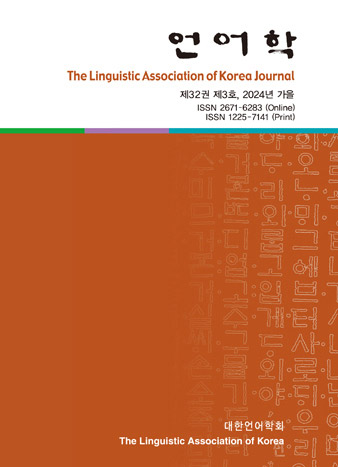대한언어학회 전자저널

-
Machine Translation of Idiomatic Expressions and Slang Based on Korean Drama
-
In Support of the Non-Derivational Analysis of Korean Ditransitive Constructions
-
ChatGPT-integrated English Writing: Writing Strategies and Perceptions
-
On the Differences between American and British English Bible Versions with Reference to get Passive
32권 3호 (2024년 9월)
- ChatGPT-integrated English Writing: Writing Strategies and Perceptions
-
Hyesook Park
Pages : 85-103
Abstract
Keywords
# ChatGPT # English writing # writing strategy # writing anxiety
References
- Barrot, J. S. (2023). Using ChatGPT for second language writing: Pitfalls and potentials. Assessing Writing, 57, 100745. DOI: 10.1016/j.asw.2023.100745
- Cao, S., & Zhong, L. (2023). Exploring the effectiveness of ChatGPT-based feedback compared with teacher feedback and self-feedback: Evidence from Chinese to English translation (arXiv:2309.01645). arXiv. DOI: 10.48550/arXiv.2309.01645
- Chan, C. K., & Hu, W. (2023). Students' Voices on Generative AI: Perceptions, Benefits, and Challenges in Higher Education. International Journal of Educational Technology in Higher Education, 20(43). DOI: 10.1186/s41239-023-00411-8
- Choi, J. G. (2023). A study of Korean college students’ perceptions on English writing anxiety. Foreign Languages Education, 30(4), 25-45.
- Choi, Y. (2023). Exploring perceptions of Korean pre-service English teahcers on using ChatGPT in the English writing process. Journal of the Korea English Education Society, 22(2), 243-262.
- Hong, K. H. (2024). Exploring Korean EFL learners’ interest in using ChatGPT for their English language learning. English Language Teaching, 36(1), 25-36.
- Hwang, G.-J., & Chen, N.-S. (2023). Editorial Position Paper: Exploring the Potential of Generative Artificial Intelligence in Education: Applications, Challenges, and Future Research Directions. Educational Technology & Society, 26(2). https://www.jstor.org/stable/48720991
- Hwang, K.-H., Heywood, D., & Carrier, J. (2023). The implementation of ChatGPT- assisted writing instruction in ESL/EFL classrooms. New Korean Journal of English Language and Literature, 65(3), 83-106.
- Im, K. (2024). Research on English teaching and learning methods using ChatGPT. The Mirae Journal of English Language and Literature, 29(2), 101-126.
- Jeon, E. Y. (2018). The effect of learner-centered EFL writing instruction on Korean university students' writing anxiety and perception. TESOL International Journal, 13(3), 100-112.
- Jeong, N.-S. (2024). Exploring the effects of ChatGPT on university students’ English writing skills and their perceptions. Multimedia-Assisted Language Learning, 27(1), 78-95.
- Jung, H. (2023). Navigating ChatGPT’s challenges to English writing education: Finding a path forward. The Journal of Modern British & American Language & Literature, 41(3), 239-261.
- Kim, J. Y. (2016). English writing strategies of Korean university students by English proficiency levels. The Journal of Studies in Language, 32(1), 47-74.
- Lee, H., Kim, T., & Jeon, J. (2023). A study of evaluation and feedback analysis of Korean English instructors, native English instructors, and ChatGPT on college student’ English writing. The Journal of Modern British & American Language & Literature, 41(4), 247-270.
- Lee, Y.-J., & Davis, R. O. (2024). A case study of implementing ChatGPT for university’s general English courses: Focuing on English language learners’ self-regulated learning and grit. Secondary English Education, 17(3), 73-87.
- Liu, C., Hou, J., Tu Y.-F., Wang Y., & Hwang, G.-J. (2021). Incorporating a reflective thinking promoting mechanism into artificial intelligence-supported English writing environments. Interactive Learning Environments, DOI: 10.1080/10494820.2021.201 2812
- Liu, M., & Ni, H. (2015). Chinese university EFL learners’ foreign language writing anxiety: Pattern, effect and causes. English Language Teaching, 8(3), 46-58. DOI: 10.5539/elt.v8n3p46
- Pae, J.-K. (2007). Wiki-based English writing: Its effect on English writing proficiency and anxiety and Korean learners’ perceptions. Multimedia-Assisted Language Learning, 10(1), 81-105.
- Park, E. H. (2019). Exploring the writing strategies perceived and actually used by less experienced students in English writing through surveys and the think-aloud method observation. Studies in Foreign Language Education, 33(2), 281-300.
- Shin, D. (2023). Utilizing ChatGPT in guided writing activities. Journal of the Korea English Education Society, 22(2), 197-217.
- Su, Y., Lin, Y., & Lai, C. (2023). Collaborating with ChatGPT in argumentative writing classrooms. Assessing Writing, 57, 100752. DOI: 10.1016/j.asw. 2023.100752
- Woo, D. J., Wang, D., Guo, K., & Susanto, H. (2024). Teaching EFL students to write with ChatGPT: Students' motivation to learn, cognitive load, and satisfaction with the learning process. Education and Information Technologies. DOI: 10.1007/s10639-024-12819-4
- Yoon, H. H. (2024). An Investigation of EFL College Students’ L2 Academic Writing Anxiety. Studies in British and American Language and Literature, 152, 241-269.